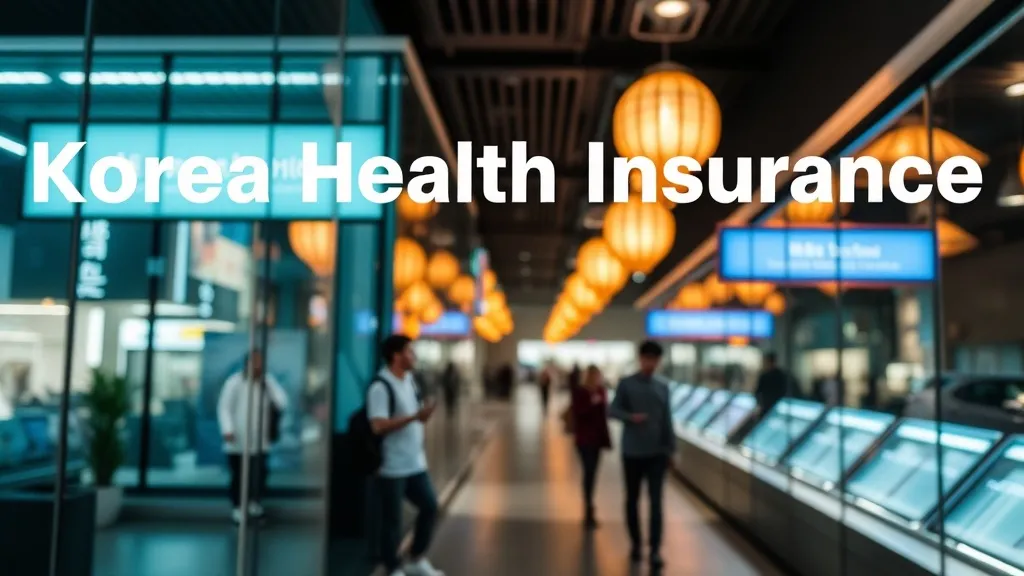Korea Health Insurance Foreigners Guide
Agree: Navigating Korea’s healthcare maze can feel daunting when you’re far from home. Promise: In this guide to health insurance in Korea for foreigners, you’ll learn exactly how to enroll, what costs to expect, and ways to secure top-notch care. Preview: We’ll dive into NHIS registration, private plan perks, English-friendly hospitals, and cost breakdowns (plus pro tips!).
Did you know that foreigners staying in Korea for more than six months must enroll in the National Health Insurance Service (NHIS)?[1] It’s true. You can’t skip it—so let’s get you covered from day one.
Table of Contents
- Health Insurance in Korea for Foreigners: Mandatory NHIS Explained
- How to Enroll in NHIS: Step-by-Step Process
- Supplementing NHIS with Private Insurance
- Finding English-Friendly Healthcare Providers
- Costs, Coverage Limits, and Common Pitfalls
- FAQ: Health Insurance in Korea for Foreigners
- Is health insurance mandatory for foreigners in Korea?
- How do I enroll in the NHIS as a foreigner?
- What are the benefits of private health insurance for expats in Korea?
- Can I use NHIS in rural areas?
- Conclusion
Health Insurance in Korea for Foreigners: Mandatory NHIS Explained
You might think expats are exempt—think again.
Almost every foreigner on an F-visa or E-visa staying over six months must join the NHIS as soon as they arrive. Why? Korea’s system pools risks to keep premiums low and care accessible for all residents (including you!).
NHIS covers about 60–80% of most treatments, from general check-ups to hospitalization. You’ll pay roughly 3.5% of your monthly salary as a premium, split between you and your employer (or fully by you if self-employed).
“Enrolling in NHIS is the single most important step for expats in Korea,” says Pacific Prime.
Actionable takeaway: Head to the NHIS website or office with your Alien Registration Card (ARC) and passport.
How to Enroll in NHIS: Step-by-Step Process
Feeling lost? Let me explain…
Fortunately, enrollment is straightforward when you follow the steps below.
- Prepare Documents: ARC, passport, proof of address.
- Visit NHIS Branch: Locate your district office (find yours here).
- Submit Application: Fill out the form and pay the first month’s premium.
- Receive NHIS Card: Valid immediately for doctor visits.
Pro tip: If you’re short on time, get someone who speaks Korean to help—lines can be long.
Actionable takeaway: Bookmark the NHIS enrollment checklist and tackle it within your first week.
Supplementing NHIS with Private Insurance
Here’s the thing: NHIS is great, but it isn’t perfect.
Specialized treatments, shorter waiting times, and private room options often require extra coverage. That’s where private health insurance for expats in Korea comes in.
Many expats choose a supplemental plan that covers dental, vision, and alternative therapies. Plans start around ₩50,000–₩100,000 per month, depending on age and risk factors.
“Private plans fill the gaps left by NHIS—especially for families and older expats,” notes EduRoadUSA.
- Shorter wait times for specialists
- Broader network of English-speaking doctors
- Coverage for dental, mental health, and maternity
Actionable takeaway: Compare quotes from major brokers before picking a plan.
Finding English-Friendly Healthcare Providers
You might be wondering: Where can I actually use my insurance without a language barrier?
Major hospitals in Seoul and Busan now offer full English support. For example, Seoul National University Hospital’s International Healthcare Center and Asan Medical Center’s foreign patient floor both provide 24/7 English hotlines.
Smaller clinics may not advertise in English but often have bilingual staff. A quick search on ACLIPSE can point you to vetted options near you.
Actionable takeaway: Save a PDF of your NHIS and private policy for offline use at clinics.
Costs, Coverage Limits, and Common Pitfalls
Let’s cut to the chase: Money matters.
NHIS premiums hover around 3–4% of your salary, but self-employed expats pay the full share. Private plans vary widely—budget at least ₩600,000 annually for decent family coverage.
Coverage caps apply: NHIS generally reimburses up to 80% of prescribed treatments. Private plans often have waiting periods of 30–90 days for pre-existing conditions.
Actionable takeaway: Use our Korea National Insurance Foreigners calculator to budget your premiums and out-of-pocket expenses.
FAQ: Health Insurance in Korea for Foreigners
Is health insurance mandatory for foreigners in Korea?
Yes. Anyone on an F-visa or E-visa staying over six months must enroll in NHIS within 14 days of arrival.[1]
How do I enroll in the NHIS as a foreigner?
Collect your ARC, passport, and proof of address. Visit your local NHIS office, fill out the form, and pay your premium. You’ll get your NHIS card on the spot.
What are the benefits of private health insurance for expats in Korea?
Private plans cover gaps in NHIS, including shorter waits, dental, vision, and specialized therapies. They’re especially useful if you need quick specialist access or have a family.
Can I use NHIS in rural areas?
Coverage exists nationwide, but English-speaking facilities are less common outside major cities. Consider private insurance for peace of mind in remote regions.
Conclusion
Understanding health insurance in Korea for foreigners may seem like a puzzle, but it boils down to three essentials: enroll in NHIS quickly, consider private cover for extra perks, and always know where to find English-friendly care.
By registering on day one, comparing private plans, and keeping your documents handy, you’ll stay healthy—and stress-free—during your stay.
Next steps:
- Visit your NHIS branch to register within 14 days.
- Get quotes from at least three private insurers.
- Save a list of English-speaking clinics near you.
The bottom line is: with the right insurance mix, you can focus on settling in, not on medical bills. Stay safe and enjoy your time in Korea!





